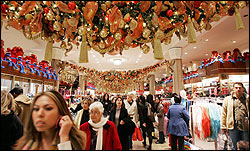Ho, ho, ho, my ass. It’s not that I don’t want to be in the Christmas spirit. Quite the opposite. I like Christmas, Peace on Earth, a time of festiveness, and all that. It’s just all the—stuff.
It’s the lingering suspicion that “ho, ho, ho” is now a registered trademark of the North Pole Corp., which has now been bought out by Wal-Mart and is henceforth doing business as Santa’s Club. Always the fastest sleigh. Always. It’s the decidedly unholy emphasis on buying, rammed down our throats by every single radio and TV ad and the ever-thickening newspapers from October onward, all reminding us in one or another fashion that we’re supposed to give people (including ourselves) stuff. Lots of stuff. Actually, skip the giving; just shut up and buy it. God doesn’t really care what we do with it all afterward, he just wants us to consume.
And this is one faux religion where the adherents are enthusiastic. What’s amazing is how many people literally buy into this. The mobs at the malls on the day after Thanksgiving are Exhibit A. A certain big-box store (OK, it was Target) actually advertised this year that if you called a particular number, it would give you a wake-up call for its 6 a.m. sale. Another big box, Fred Meyer—owned by Kroger, the world’s second largest food retailer behind Wal-Mart—opened at five in the morning. And undoubtedly people came. Pity the poor slobs who had to work those hours.
For a few years now, some plucky activists have been trying to peddle the idea of making the day after Thanksgiving “Buy Nothing Day.” It’s a lovely idea, one whose concept could usefully be expanded to include the entire month.
Remember that great, women-owned independent pharmacy I’ve cited in past columns, the one I’ve relied on for more than a decade? Kroger bought it last month, under another subsidiary, QFC, which used to be a high-end food store before it cheapened itself under Kroger and started branching out into pharmacies and everything else.
This is our future. Small, independent retailers are doomed, particularly if consumers are making buying decisions based solely on price and convenience. (Rather than, say, quality or community support.) In some near, indeterminate time, two or three megacorporations will sell us everything we eat, wear, or use. Monorails will effortlessly whisk us, the way they do in airports, from the hardware section to grocery to men’s apparel. And it will all be made in China or grown in Brazil by people making a dollar every third month.
On several levels, this is a really bad idea. First of all, if we’re all working for substandard wages for these huge companies, none of us will be able to afford even the cut-rate merchandise they sell. (Unions? Don’t make me weep.) The global economy is utterly reliant these days on the willingness of the American consumer to spend, preferably far beyond his or her means. Which, thanks to credit cards, is exactly what we’re doing, at ever-more-unsustainable rates.
And speaking of unsustainable, that stuff all has to come from somewhere and go somewhere after we’re done playing with it, and we’re running out of room. Our society produces more garbage than we know what to do with, and the material resources needed to manufacture all this stuff are—in the petroleum that makes plastic, the metals that go into semiconductor chips, and in all too many other cases—exceedingly finite. We’ll run out some day, and it’s a dicey game to rely on technology to invent new ways of exploiting our tired planet before we exhaust the old ones.
That’s the consumer end of things. But what bugs me even more about this holiday season is what we’ve lost. This is supposed to be a spiritual season, a time for reflection, not an orgy of consumption. A time for families and companionship, for benevolence, for cherishing all the nonmaterial things we hold dear. A time even to aspire to the more rarified goals of Christianity or any of the other faiths that celebrate this time of year: Peace on Earth, loving thy neighbor, vowing to make changes for the better in our own lives.
Which is all hard to do when we’re busy getting ready for the after-Christmas clearance sales. But it’s worth trying.







